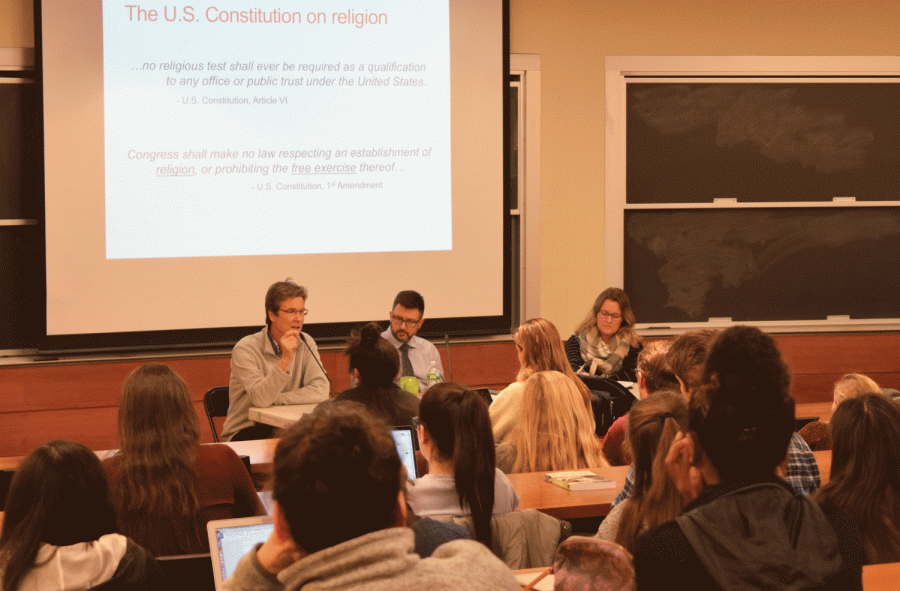The Impact of Religion on the United States Government
Students gather in Ho 101 to listen to the faculty panel on religious rights. Here, professors touch on different court cases that emphasize the history and impact of religion within the United States.
On Thursday, February 15, the Lampert Speaker Series continued in Ho 101 with the lecture “Religious Rights in Contemporary America: A Colgate Faculty Panel.”
The first portion of the panel was divided equally between the professors, allowing each to establish their opinions and background. Assistant Professor of Religion Jenna Reinbold initially discussed the history of religion within the United States, explaining that early religious scholars molded models of religious understandings around Christianity, giving more validity to traditions resembling the Christian faith.
Reinbold discussed Article VI and the First Amendment, the primary references to religion in the United States Constitution. Article VI states that, “No religious test shall ever be required as a qualification to any office or public trust under the United States,” while the First Amendment promises that “Congress shall make no law respecting an establishment of religion, or prohibiting the free exercise thereof.” These two references provide the religious liberty granted to Americans today.
Although Reinbold mentioned the 1944 case of United States v. Ballard, which concluded that religion isn’t the place of the law, these issues still appear. Professor of Political Science Timothy Byrnes expanded on the role of the government in dealing with religious issues with the case of Wisconsin v. Yoder, in which an Amish family won the right to withdraw their child from school starting after the sixth grade for religious reasons.
Byrnes argued that in creating a law to protect the practice of religion, the U.S. government could be viewed as establishing rights for individuals based on their faith, therefore establishing a religion. Because of this, Byrnes believes the First Amendment rights conflict with each other.
Professor of Philosophy David Dudrick brought a philosophical perspective into the discussion, explaining his belief that the egalitarian view that the United States’ justice system seems to be based on stems from the Christian principle of equality.
First-year Alex DiChiara appreciated the diversity of the opinions presented.
“The panel was super interesting as each professor came in with a different expertise and take on church and state and I think it’s super important to talk about, as the United States is becoming more and more religiously diverse,” DiChiara said.
The conversation then focused on the Masterpiece Cakeshop v. Colorado Civil Rights Commission case. This case dealt with a pastry shop denying service to a same-sex couple on the grounds that making this cake would infringe on the baker’s religious beliefs.
The speakers discussed whether the United States’ justice system has a role in deciding how individuals should act on their religious liberties.
The speakers believed the United States government should force the shop to serve the couple, as this is a classic example of discrimination.
Dudrick expanded on the above belief arguing that the government should stay out of individual business management and that the market would punish the kind of behavior represented in the given example.
First-year Patrick Hunter voiced his fascination with this topic.
“I was interested by the argument of religious practices changing how a business should operate, [and] if a religion should allow someone to be exempt from serving someone or something,” Hunter said.
The discussion on Thursday brought up many aspects of the role of the government in deciding civil liberties, and listeners walked away thinking more about religious rights in the United States. The Lampert Speaker Series will continue its focus on Human Rights in its next lecture on Tuesday, March 20, at 4:30 p.m. in the Robert H.N. Ho Science Center.
Contact Henry Claudy at [email protected].







